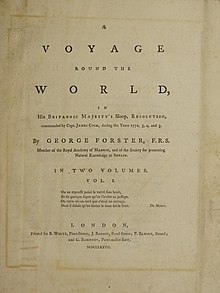 Title page from the first edition of A Voyage Round the World | |
| Author | Georg Forster |
|---|---|
| Language | English |
| Genre | Travel literature |
| Publisher | Benjamin White |
Publication date | 17 March 1777 |
| Publication place | England |
| Pages | 1200 (in two volumes) |
| OCLC | 311900474 |
A Voyage Round the World (complete title A Voyage Round the World in His Britannic Majesty's Sloop, Resolution, Commanded by Capt. James Cook, During the Years 1772, 3, 4, and 5) is Georg Forster's[nb 1] report on the second voyage of the British explorer James Cook. During the preparations for Cook's voyage, the expedition's naturalist Joseph Banks had withdrawn his participation, and Georg's father, Johann Reinhold Forster, had taken his place at very short notice, with his seventeen-year-old son as his assistant. They sailed on HMS Resolution with Cook, accompanied by HMS Adventure under Tobias Furneaux. On the voyage, they circumnavigated the world, crossed the Antarctic Circle and sailed as far south as 71° 10′, discovered several Pacific islands, encountered diverse cultures and described many species of plants and animals.
When they returned to England after more than three years, disagreement about the publication rights for a narrative of the journey arose. After plans agreed with John Montagu, 4th Earl of Sandwich, the First Lord of the Admiralty, to publish a joint work with contributions by both Cook and Reinhold Forster had fallen through, Georg, who was not bound by any agreement with the Admiralty, began writing Voyage in July 1776. He published on 17 March 1777, six weeks before Cook's A Voyage Towards the South Pole and Round the World appeared. While 63 copper engravings, paid for by the Admiralty, illustrated Cook's account, only a chart of the Southern Hemisphere showing the expedition ships' courses illustrated Forster's Voyage, which was sold for the same price.
While Forster organised Voyage chronologically, he wrote it as entertaining literature, focusing not on the nautical aspects of the voyage but on scientific observations and on the cultural encounters with the peoples of the South Pacific. This was well received by critics, who praised the writing, especially in contrast to Cook's book, but sales were slow. Controversy continued after the publication. Resolution astronomer William Wales suspected Reinhold Forster of being the true author and published many accusations in his Remarks on Mr Forster's Account of Captain Cook's last Voyage round the World that prompted a Reply to Mr Wales's Remarks in which Georg defended his father against the attacks. Voyage brought Georg Forster great fame, especially in Germany. It is regarded as a seminal book in travel writing, considered a major influence on the explorer Alexander von Humboldt, and has become a classic of travel literature.
Cite error: There are <ref group=nb> tags on this page, but the references will not show without a {{reflist|group=nb}} template (see the help page).
